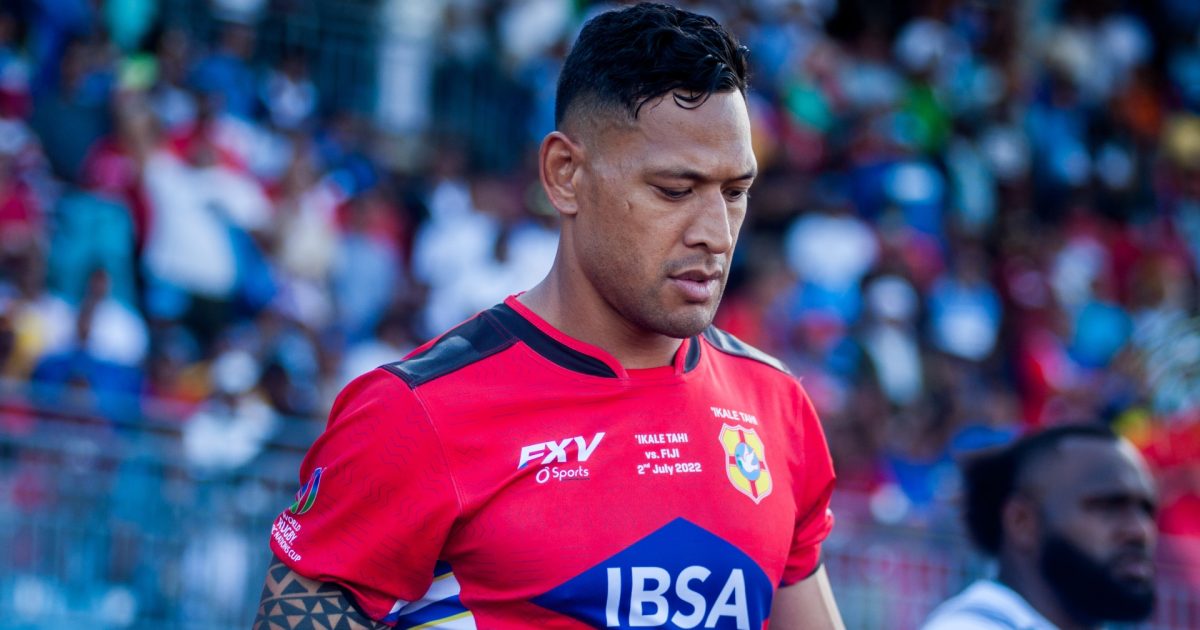'On paper, that is probably the strongest team we have put together'

Tonga captain Nili Latu says he is expecting “big things” from the ‘Ikale Tahi at Rugby World Cup 2023 if the big-name players named in Wednesday’s 35-man training squad can gel together in time.
Tonga boss Toutai Kefu has named a star-studded 35-man squad for his team’s July fixtures in the run-up to the 2023 Rugby World Cup, a selection that includes former Wallabies lock Adam Coleman and Pita Ahki as the most recent players committed to becoming dual internationals.
Coleman, the 38-cap Wallaby, and former New Zealand 7s and U20 international Ahki, have switched their national allegiance and further strengthened a squad already benefitting from World Rugby’s new eligibility ruling.
Former All Blacks Charles Piutau, Malakai Fekitoa, Augustine Pulu and George Moala and two ex-Wallabies in Israel Folau and Lopeti Timani have played for Tonga since the rule change that allows players to represent another country after a three-year absence from Test rugby.
“On paper, that is probably the strongest team we have put together,” said the former No.8, who led Tonga for the majority of his 48-cap career.
“We should be there around at the business end, in the top two in the pool, but the game isn’t played on paper.
“Adam and those boys have never been in that environment so it will be interesting to see how quickly they come together especially with the time they have leading into the World Cup.
“We’ll get a good look at them through the PNC, which is coming up next month (a series of games against Fiji, Samoa and Japan).
“We’ve all seen them play for previous countries, New Zealand or Australia, so they bring a lot of experience and knowledge,” Latu added.
“If you look at that backline, it is really stacked and our forward pack as well is looking really good. But it is one thing to look good and it is another to put a complete performance together with a new team.”
Coleman’s late father captained Tonga’s rugby team in 1983 while cousin Inoke Afeaki played in the 1995, 2003 and 2007 Rugby World Cups for Tonga. Ahki, meanwhile, was a Tonga U20 international before being capped by Australia so both have a strong connection.
Auckland-based Latu, who is currently head coach to the Tonga’s women’s team, hopes that all the players brought into the fold see playing for the ‘Ikale Tahi as a badge of honour, not convenience.
“We go in with pure passion and emotion, just knowing who we are, and what we can add as players to a small country. We are not just playing rugby, we are advertising our country on the biggest stage,” he said, emphasising what it means to play for Tonga.
“Whatever we put our minds and heart to, we can do it. But if we don’t align ourselves together, and not everyone is on the same page, we are own worst enemy.
“I hope the squad that they have assembled understand who we are as people and are not just playing for Tonga because the jersey has been given to them.
“I am a big believer that you have to value the jersey. It’s different to just, ‘I am going to the World Cup, I have ticked that off the bucket list’ I hope that is not the case with team going to the World Cup.”
Tonga, who are in Pool B with South Africa, Ireland, Scotland Romania, have never qualified for the quarter-final stages before but got mighty close, in 2011, when they caused one of the biggest shocks in the tournament’s history with victory against France.
Latu didn’t play in that tournament but experienced the Rugby World Cups on either side, in 2007 and 2015.
“I always back the boys and on our day we can turn any team over but, for me, the PNC will let us know where they are as a team,” he asserted.
“Time is never on our side but I know the coaches and the staff behind the scenes have already put plans together for this campaign.
“When you at the team everybody brings something different as individual players, they are so good, It is now about putting the pieces together and everybody understanding the role they have to play. That is always the hardest part.”
“As a supporter and an ex-player, I am expecting big things with the squad they have.”












































































